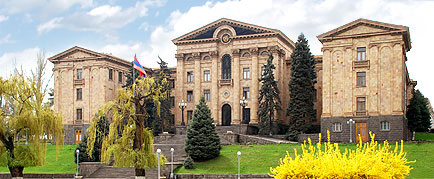On April 10, the Member of the RA NA delegation to PACE, the General Rapporteur in PACE Armen Gevorgyan delivered a speech during the panel debate of the Global Parliamentary Forum held in Washington.
“Dear colleagues,
Let me start by underlining the crucial importance of the topic we have on our agenda. We are witnessing three acute challenges which will have a profound impact on our future. In particular, I mean the following:
- Worsening environmental situation;
- Change of global security architecture;
- Decline in the quality of the human capital in general.
Evaluating shifts and transformations in educational mega-sphere must be a high priority for us. It has no less significance than the growing risks of rise of average temperature on the planet or the potential nuclear catastrophe.
Let me draw your attention to two transformations on global scale, which took place at the turn of the 20th – 21st centuries.
First. The technological progress has re-made a completely new environment for social integration of peoples, where group networks and preferences, or in other words “the social life,” have gradually become less important compared to the principle of unconditional individual freedom and new forms of self-expression in the same environment.
A comprehensive survey done by the Wall Street Journal and University of Chicago revealed that in the United States, for example, patriotism, religious faith, having children and other priorities that helped define the national American character for generations have sharply receded in importance. I believe this trend is rather widespread in most developed nations.
Second. Tectonic shifts in the world have caused the middle class - the main driving force of free liberal economic and social relations - to erode and in fact lose its historical purpose as a foundation for any sustainable democratic regime. Many developing nations, most likely, will not see through any formation of a middle class. In many places we are witnessing the emergence of a new - digital - society, for which it’s difficult to define any criteria for social welfare and group affiliation. At the same time, we are going to deal with another reality where more research in so-called meta-reality and metaconscience is being funded.
With a degree of certainty we can claim that the fundamental transformations of the global educational environment can be traced in the following aspects:
One. The apparent trends of introducing consumer approach in education, where “customer is always right;”
Two. The correlation between the decline of democratic regimes in the world and the level of education;
Three. Potentially massive losses for the young generation due to the current defects in educational system;
Four. Reincarnation of our societies into certain “digital colonies” where corporations and their algorithms create tools for manipulating public opinion and which, at the end of the day, worsens the quality of democratic governance, accountability, and transparency.
Five. Deepening inequality between and among nations, as well as internally inside states, reinforced factors of social injustice and decreasing levels of public mistrust.
Colleagues,
Summarizing my general observations, let me suggest five broad ideas as a framework for discussion and most probably incentives to act.
First. The biggest deficit in the world today is positivity. As a result of the activities of modern political elites, the so-called negative trend has formed and does not leave a significant part of humanity. We have to break this trend of negativism, and do it through education, restoring optimism and striving for the best. The global educational space must serve as the main mechanism for dialogue across generations and nations. I also believe, education must serve as the main driver for eco-friendly life, promoting the green way of thinking.
Second. Political populism is gaining momentum in the world. Unfortunately, many modern political actors do not attach special importance to the level of their own educational achievements. We need to think about how to make the continuous learning and training programs reality for those who are involved in the political decision-making process, specifically, the parliamentarians and the members of governments. By own personal example, we can bring new moving forces to the world of education.
Third. The backsliding from democracy in the world is also expressed by tendencies of increased control by political forces over the work of educational institutions, especially universities. I think the time has come for international organizations to provide significant support for the preparation and publication on an institutional basis of the Academic Freedom Index. Structural and future-oriented reforms are doomed to failure if the country’s academic environment is under high political pressure.
Fourth. I think it’s high time that we shall eyewitness the most influential heads of states and governments calling for a summit to discuss issues of education and eventually give birth to a Framework document on new strategy of development of education in the 21st century. Leading up to such a forum, a global dialogue on the development of education can be fostered within the frameworks, for example, of G-20 and the UN General Assembly.
And finally, but perhaps before launching any new initiatives, it will be most prudent to focus on implementing the decisions already been made. In particular, I believe international community shall more pragmatically achieve the implementation of the 17 Sustainable Development Goals (SDGs), by increasing the level of coordination and coherence between and among national strategies and inter-governmental communication. It's highly important to recognize that non-achievement of SDGs will, unfortunately, testify to the inability of the international community to define development goals and create necessary conditions for their achievement,” Armen Gevorgyan said.




 10.04.2023
10.04.2023 10.04.2023
10.04.2023
